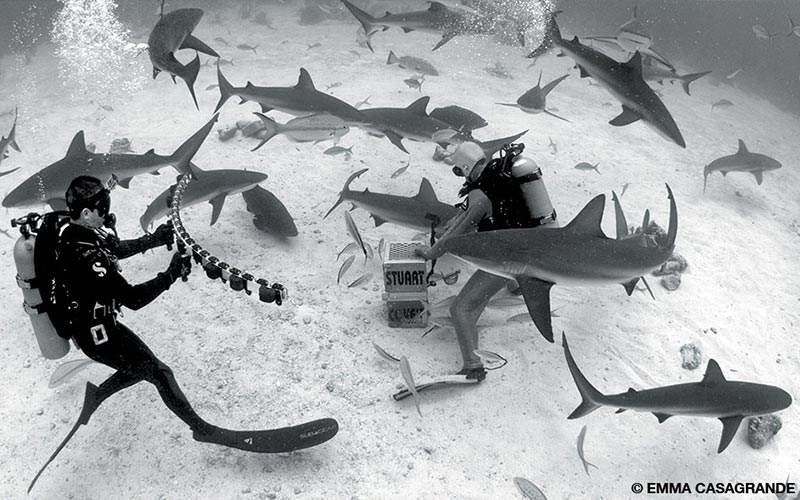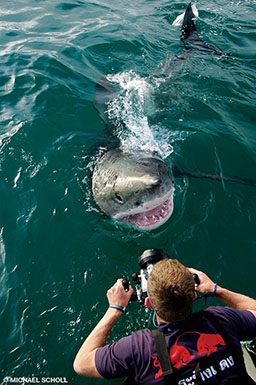Hometown: Naples, Fla.
Years Diving: 17
Favorite Dive Destination: South Africa. That’s where I saw my first great white shark and where I launched my career. It has the sardine run, killer whales, great whites — everything.
Why I’m a DAN® Member: With the insurance and evacuation benefits and even the basic travel coverage, I would be foolish not to be a DAN member. It’s an important thing to have in your pocket when things go wrong.
Two-time Emmy Award-winning cinematographer, producer, television presenter, wildlife filmmaker and shark diver extraordinaire Andy Casagrande wears many hats. A shark fanatic since his youth, he has shot and produced more than 100 shark films and wildlife documentaries for National Geographic, BBC, Discovery Channel, Animal Planet and many more. When he’s not traveling and diving to the world’s sharkiest places — often with his Swedish wife, Emma, and two kids — you’ll find him building custom photography rigs in his garage in Naples, Fla.

How many years have you been diving?
I got certified in Monterey, Calif., in 2000. During my first open-ocean dive I lost both the divemaster and my dive buddy because my mind was wandering off into great white shark land. I started swimming around looking for them. Then I realized I wasn’t certified yet and probably should be learning how to use my life-support system rather than looking for apex predators.
How did your great white shark fascination first start?
My entire life has been based around my fascination with great white sharks. I was born in New York City, so TV, books and magazines were my direct line to learning everything I could about white sharks. At first I wanted to become a marine biologist; I went to four different universities, and my grades were good, but I quickly lost interest in the academic approach to studying wildlife. I decided the best route was to become a wildlife filmmaker.

Why apex predators?
It’s hard not fall in love with an animal that’s so iconic, beautiful and mysterious. Most people misunderstand what great whites are about, but being in the water with one is totally enthralling. You know it has the power to kill you, but you also know it’s not some malicious creature — it’s just an animal trying to survive.
What is the media’s responsibility in portraying sharks?
Conveying truth and the facts above all. Media comes in all forms, and at its best it can inspire people through vicarious experiences. You can witness some of the most spectacular locations and wildlife encounters on the planet from your own home. In an ideal world, the media would be something that led people to care about our planet and each other and to act nobly and coexist with the universe.
What was your most memorable underwater moment?
The highlight of my underwater life was diving with a whole pod of transient killer whales off the far north coast of New Zealand. I feel like I’m cheating on great white sharks when I say that, but orcas are a close second for me when it comes to my favorite marine animal. More recently, in Western Australia filming for Shark Week, I encountered two white sharks that never left each other’s side; it was like they were attached at the fins.
Shark Week polarizes many people. What’s your take?

The networks decide on the style, pace and mood of a program, and I always do my best to capture the most amazing images of the animal so people watching can be inspired just like I was. I grew up watching Shark Week, and I was completely fascinated, not afraid. Sometimes Shark Week has the scary music and effects, and sometimes I just turn off the sound and watch the pictures. But I think Shark Week does a lot more good than harm because it has spread awareness and helped create communities and social media campaigns that force people to acknowledge that sharks are a keystone species and critical to the environment. Love it or hate it, the shows have helped people understand the shark’s plight and have made the great white shark the world’s most famous wildlife superstar.
Where would you send people to first get their feet wet with shark diving?
The Bahamas. It’s one of the most straightforward shark diving destinations on earth. You have amazing visibility, an incredible diversity of shark species, and it’s very accessible. Tigers, hammerheads, blacktips — the list goes on and on; they’re all there.
What’s next for you?
Killer whales in New Zealand. I’m heading there with the Orca Research Trust, a research team out of New Zealand that’s been studying orcas for the past 25 years. We hope to film orcas hunting sharks. Orcas in South Africa, New Zealand and other places around the world hunt sharks, but the footage so far hasn’t been great. In the past year there have been more than five confirmed kills of great white sharks by orcas. People like to glorify great whites because they’re so badass, but we know killer whales are the true apex predators of our oceans. So we’re going to try to capture them in action hunting and killing sharks.

Explore More
| © Alert Diver — Q4 2017 |